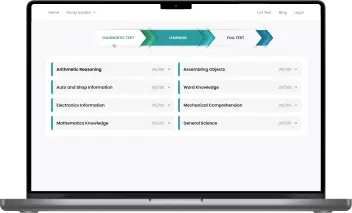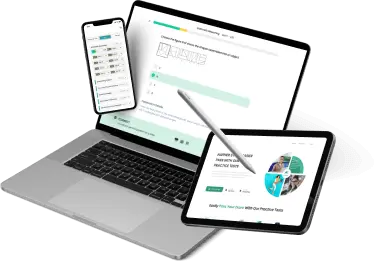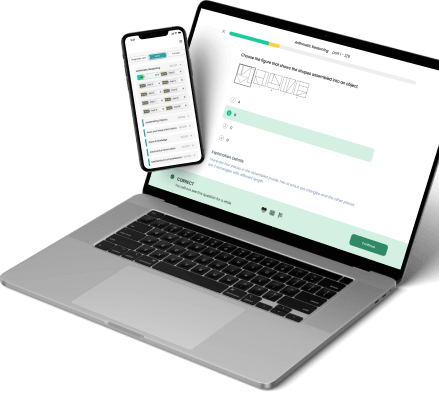Fun & effective CPCE practice test tool to pass with flying colors
All-in-one platform with everything you need to ace the CPCE on your first attempt
Clear and Thorough Learning Path
Proven CPCE 3-step Practice Formula
After our 100,000+ users' success stories, we developed a 3-step strategy to provide you with the most precise and in-depth learning path while minimizing your prep time.CPCE Diagnostic Test
First, take this short test and get your detailed report showing your strong and weak areas. Save your time by concentrating on what is in demand.Learning
With quick, bite-sized learning techniques and a detailed study guide for each CPCE section, you can really strengthen your weaknesses (from step 1) and boost your scores.CPCE Full Test
The last step for your preparation is taking our full CPCE practice tests and seeing how far you've come since the beginning. Repeat the 3-step formula until you are satisfied with your results!Ready to start?
Thousands of CPCE users already accomplished their goals.NOW it’s your turn!

What You Get

All-in-one platform
A complete CPCE Prep Platform, including a diagnostic test, detailed study guides for all topics, practice questions with step-by-step explanations, and various full simulator tests.
Questions nearly identical to those in the real CPCE test
All questions are categorized into the specific sections as on the real CPCE: Same format & same difficulty!
Best for the busy
Easily & quickly grasp all the knowledge with our unique learning technique. And you can learn anytime, anywhere on any devices, even with a few free minutes.
Practice while having fun
Learn and play! Complete round-by-round to reach your daily achievement and make progress on your learning journey!Featured on















What our users are saying
Over 50,000 aspiring American candidates use CPCE monthlyIf you're looking for a detailed guide on the CPCE (Counselor Preparation Comprehensive Examination), look no further. Everything you need to know about the test is included in this guide, from its goals and format to study advice and additional resources. Whether you're a counselor pursuing certification or a graduate student, this guide will give you the confidence and tools you need to ace the CPCE.
The Counselor Preparation Comprehensive Examination (CPCE) is an exit exam designed to assist test-takers in synthesizing their counseling learning and ensuring that test-takers have a thorough understanding of professional attitudes, skills, and knowledge related to the eight (8) common-core areas defined by CACREP's Standards for Preparation. The exit test is also used to examine the strengths and weaknesses of the counseling program.
Who Is The CPCE For?
The CPCE is intended to serve as a final test for master's level counseling students. More than 400 colleges and universities in the United States utilize the CPCE to assess students' understanding of counseling concepts and practices. The CPCE may be required for graduation.
The CPCE is a technique for assessing counseling education programs. It is not a test that leads to a license or certification. The Center for Credentialing & Education (CCE), which is linked with the National Board for Certified Counselors (NBCC), is in charge of the CPCE. Furthermore, the CPCE is an effective study tool for preparing for the National Counseling Examination (NCE), a licensing exam.
What Are The Benefits Of The CPCE?
The CPCE can serve as a baseline for students to ensure that their understanding of counseling issues is gained before registering for and sitting for the NCE. The CPCE enables students to learn their strengths and limitations while taking an examination of this type, allowing them to focus their preparation for the NCE. Furthermore, when responding to evaluation questions, students taking the CPCE have the chance to combine the different content taught during their graduate careers.
At the university level, the CPCE may assist counseling educators in assessing their program and ensuring that counseling students are meeting departmental objectives. This standardized evaluation provides data for program development and self-study, especially for programs pursuing CACREP (Counsel for Accreditation of Counseling and Related Educational Programs).
CPCE Exam Details
CPCE Applicant Prerequisites
Students must have completed all core courses before the last semester of the OPS MSCP Program and be in good academic standing to be eligible for the CPCE. The cost of the CPCE is $50 per student. On the day of testing, students can make checks payable to CCE and send them in with the scoring sheets. Checks that do not clear may postpone the delivery of students' results to the OPS MSCP Program, and hence their graduation.
Students will be alerted through email via the OPS MSCP website that they must pass the CPCE and vignette questions to graduate from the OPS MSCP program. The exam will be given in the booklet and Scantron format at an OPS-approved venue at the start of the final semester of the program, giving students who do not pass the chance to repeat the examination in the final semester of the program. Students who do not reside near the CBU campus will need to make alternate proctoring arrangements on an individual basis.
Time duration
The CPCE will take four hours to complete, and the clinical vignette questions will take an hour.
CPCE Content covered in the exam
The CPCE covers the following topics:
- Human development and growth
- Social and cultural diversity
- Relationship support
- Group projects
- Career Development
- Evaluation
- Research and Program Evaluation
- Professionalism and ethical behavior
The following work behaviors are also included in the CPCE:
- Counseling fundamentals;
- Counseling process;
- Diagnostic and evaluation services
- Professional practice; and
- Professional growth, supervision, and consulting.
CPCE Exam registration process and fees
There are two basic ways to take the Counselor Preparation Comprehensive Examination (CPCE), and the prices are as follows:
- $150 for computer-based testing (CBT).
- $50 for CBT Reschedule Fee (up to 24 hours in advance)
- $75 for Anywhere Proctored Browser (APB).
- Vary by college and can range from $20 to $60 for APB Additional Fees
These examination costs are non-refundable. Students who have registered for the CBT test at a Pearson VUE facility may reschedule for an extra fee with at least 24 hours' notice. If a candidate wishes to repeat the exam, the exam fee(s) must be paid in full again. Some schools and institutions may charge additional costs for the APB test, such as a proctoring fee or a test center fee.
The mechanism for enrolling for and paying for the CPCE is determined by the candidate's college or institution, which may or may not have one in place. Schools that provide the CPCE through on-campus APB testing may contain a schedule of available testing dates, as well as a registration form and payment instructions, which can be paid directly to the institution.
Candidates who have not already enrolled through their school or Pearson VUE may also register for the CPCE online at cce-global.org. This entails providing demographic information as well as the name of your school.
Once you get an email from Pearson VUE authorizing your registration and providing you with a candidate ID number, you can proceed with the following steps:
- Create a Pearson VUE account.
- Counselor Preparation Comprehensive Examination (CPCE) CPCE-CBT
- Schedule the exam by selecting a testing location, day, and time.
- Verify your personal details.
- Accept CCE policies
- You must pay the charge.
- Attend the examination on the given date and time.
CPCE Preparation Strategies
It may be adequate for many people to have a strategy to review and prepare for the test two months beforehand.
Below are some strategies to prepare for the upcoming CPCE:
- Create a study plan: If your plan is two months, you should examine at least one curriculum area each week.
- Put study time aside each week; schedule it on your calendar; and stick to it: Include daytime hours in your study schedule, not only nighttime and weekend hours when you'd prefer to be doing anything else.
- Remember to go over the "old" material you studied in prior weeks while you study a new subject each week.
Utilize the SQ3R Studying Method for the CPCE
Survey, Question, Read, Recite, and Review (SQ3R).
S= Survey
- Provides a preview of what you may expect. aids in estimating how long it will take.
- Assists in showing the connections between what you already know.
For a book: read the introduction and the prologue; read the Table of Contents; Examine the visual aids, such as the images, graphs, etc; review dictionaries or reference books.
- For a chapter: Try to comprehend the chapter title; read the headers and subheadings; read the summary; read the captions beneath any photos, graphs, or other visuals; scan the reference/bibliography list.
Q = Question
- As you read, ask yourself questions about it.
- By concentrating your attention on the issue at hand, questions aid in studying.
- Questions give readers a specific reason for reading.
- You are motivated to hunt for solutions by questions.
What does the chapter title signify, for instance? Heading?
Subheading?
- What are my goals for this chapter? In what ways does the information relate to what I already know?
R1 = Read
- If you do the SQ exercises first, your comprehension and understanding of what you read will increase.
- As you read, respond to the SQ questions you posed as well as any chapter or book-specific questions that provide context and a feeling of direction.
- Read all the supplemental materials, including graphs, tables, photographs, etc.
- Carefully read any italics or bolded words or phrases that are printed. These, in the author's opinion, are crucial.
R2 = Recite
- Review what you read in R1 by either taking notes or giving a verbal summary of what you just read. In two weeks, we typically lose 80% of what we read; following recitation, we only forget 20%.
- Reciting back what you read helps you catch any errors you may have made while reading.
- Repeat as necessary, preferably more than once after each chapter.
After each part and maybe after each subsection, you might wish to recite.
- Selectively highlight and underline text, not everything. Read the full section first, then highlight the key points as you repeat once you have a general understanding of it.
- If you want to create an outline, do so, but keep in mind that it will take a lot of time. • Speaking out loud may be very useful if you are studying with someone.
R3 = Review
- First, when you've finished reading, go through the whole chapter or article.
- Reconcile the information by reading your annotations, margin notes, or outline.
- Repeat periodic reviews.
- Arrange a final review before the test.
- Allow enough time for a comprehensive and insightful assessment.
Other Suggestions for studying
- Finish practice tests and take them all at once to become accustomed to the time needed to finish 160 questions.
- Write down your responses on different pages so that you may repeat the exams. The CPCE features questions that are detail-focused, so you are likely to face fewer application questions and more recognition-recall questions.
- Use the study questions provided in this Comps Prep Program.
Plan of Action of Comps Prep Program
Week 1: Study Skills & Test-Taking Tips-Homework: Practice Test & Unit 1
Week 2: Study Unit 1 entitled Human Growth & Development - Revise Unit 2
Week 3: Study Unit 2 entitled Social and Cultural Diversity - Revise Unit 3
Week 4: Study Unit 3 entitled Helping Relationship - Revise Unit 4
Week 5: Study Unit 4 entitled Group Work - Revise Unit 5
Week 6: Study Unit 5 entitled Career Development - Revise Unit 6
Week 7: Study Unit 6 entitled Assessment - Revise Unit 7
Week 8: Study Unit 7 entitled Research and Program Evaluation - Revise Unit 8
Week 9: Study Unit 8 entitled Professional Orientation and Ethical Practices – Post-Test
Passemall CPCE Practice Test Platform
Our CPCE Application Features:
- Free Practice Questions: 500+ FREE CPCE practice questions with detailed explanations are available for all of the required skills. All you need to pass your recruitment test is available here.
- CPCE Practice Tests Based On Real Tests: Same number of questions, same time limits, same structure. The exam simulators let you familiarize yourself with the test format and get totally ready for the real one.
- No Sign-Up Or Login Required: All of your progress is saved without an account, even if you close your browser. But login can sync your data between web and mobile applications.
- Gamification: The learning process will be divided into small milestones. Let’s make your studying exciting as if you were in some interesting games.
- Personal Study Plan: Just enter your CPCE test date, and a study plan will be set up for you. A clear schedule will surely exceed your expectations and get you the best preparation for the reading shot.
- 3 Interesting Test Modes: 3 different test modes with increased difficulty levels let you experience the CPCE practice test in various ways.
- Dark Mode: Experience a dark theme that is more friendly to your eyes, and get a whole new and marvelous experience.
- No Internet Required: Study on the go conveniently without any Internet connection.
- CPCE Test Bank: 3 features: Weak/ Medium/ Strong questions help you clearly determine which area you should pay more attention to.
Test-Taking Strategies For The CPCE
There are a few guidelines to follow when taking any exam.
Using a mnemonic device is one technique to aid with memory retention for these guidelines. In this procedure, the word SCORER might be helpful.
S = Schedule your time (Scorer)
There are 160 multiple-choice questions on the CPCE.
- If you use the entire allocated four hours, this works out to 1.5 minutes per question.
- Keep in mind that on the CPCE, every question has the same weight.
C = Clue words (sCorer)
Pay attention to qualifiers or clue words. They have the power to drastically alter a statement's meaning.
- Watch out for terms like "all always best," "every usually worst," "most never more," and "some invariably less."
- As you read the question, underline these terms.
- Keep in mind that one of the four choices may also contain one or more of the clue words.
O = Omit the difficult questions (scOrer)
The O rule advises answering the exam's simpler questions first and omitting the harder ones. The idea is to come back to the challenging ones later.
- Nevertheless, since you've already read the challenging questions, you can be generating solutions as you respond to the simpler questions.
- Information that is relevant to earlier, challenging questions may be presented in later questions.
- Mark the questions you skipped in the exam booklet so you can quickly locate them later.
- Alternately, note the things you forgot to do on your "scratch" sheet.
- Make careful to skip the same places on the answer sheet if you skip things in the exam booklet.
R = Read carefully (scoRer) Part 1
After reading the exam directions, carefully read each item on the list.
- After reading the full question, pause.
Do you comprehend it? Read it again if not.
- Wait until you have a firm grasp of the question before reading any of the four responses.
- If you read the alternatives before comprehending the question, you run the risk of confusing yourself and the question's meaning.
- As you read the question, keep an eye out for any hint words.
- Don't infer more from the question than is necessary.
R = Read carefully (scoRer) Part 2
True-False questions could be more appealing to you than multiple-choice ones.
- A multiple-choice question can be broken down into four True/False options.
- Read the inquiry and the first option. Is it real or not?
- Continue with the second option after that, and so on.
- After going through the four options, you should have one "True" response left.
- If you have more than one option, you should choose just one and mark it.
- On a few of the practice questions you go through before the real exam, you might choose to use the true-false strategy. View the results for yourself. Plan to utilize this method for only some of the questions, possibly the lengthy, complicated ones, as it takes longer to complete a question using this method.
E = Estimate (scorEr)
Here, estimating refers to speculating. Do not leave any questions unanswered on the CPCE because there is no penalty for guessing.
- You are urged to apply the Omit rule while answering challenging questions. When you return to a challenging item, take out as many distractions (alternatives) as you can, and then decide if you still need to guess. A few guessing tactics have been put out.
Use these methods for guessing:
"Go with the flow," first. Choose the response that most naturally stems from the question.
- Select 'content.' Select the answer's substance to match the notions (content) provided in the question.
- Consider the difference between general and specialized. Select the response that addresses the ideas or material with the same level of "generality."
R = Review (scoreR)
Utilize the whole time provided to you by reviewing your responses. Exam fatigue may have set in at that point, but revisit the questions, paying particular attention to any you may have had.
- When taking the CPCE, you can have an hour or more left of your four hours.
- Avoid making frequent changes to your responses.
- A lot of people frequently modify an accurate response.
What To Do If You Do Not Pass The CPCE
The CPCE will be available at the start of the final semester of the OPS MSCP Program. Students will be notified via letter if they passed the CPCE and vignette portions of the test within two weeks of the exam date. In order to graduate, students who fail the exam must retake it within the next two months. Students will only need to repeat the exam sections that they did not pass the first time. Students who fail the test twice must meet with the Director of the OPS MSCP Program to develop an individual assessment plan to correct any remaining weaknesses. The CPCE national criteria are used to calculate the minimal passing score for each of the exam's eight components. The minimal passing score fluctuates from year to year and is one standard deviation below the national mean.
How Is the CPCE Scored?
The CPCE is a 160-item multiple-choice test, but only 136 of them are utilized to decide whether or not you meet the minimal passing (criterion) score. The remaining 24 pieces are being field tested to verify their appropriateness for future usage. (When you take the CPCE, you will not know which things are being field-tested.)
The maximum possible score on the CPCE is 136, while the lowest passing score, which changes across editions, is determined by NBCC using a modified Angoff process. Because the CPCE is not assessed on a "curve," your passing score is not impacted by the results of other examinees, but you can compare your score to national results.
FAQs
What is the difference between the CPCE and NCE?
The National Board of Certified Counselors (NBCC) created and manages both tests CPCE and NCE.
- The CPCE Exam features more recognition/recall and detail-driven questions and fewer application-related questions than the NCE.
- CACREP graduates can take the NCE at the end of their graduate degree, and if they pass, they can become a National Certified Counselor (NCC).
What is the purpose of CPCE?
The Counselor Preparation Comprehensive Examination (CPCE) was created by the Center for Credentialing & Education (CCE). The CPCE is designed to examine a student's understanding of basic counseling subjects taught in counselor education programs.
What is the passing score for the CPCE?
On the CPCE, a passing score is 70/136.
How long is the CPCE exam?
The CPCE is a knowledge-based test with roughly 160 items, 20 of which are from each CACREP area. Test takers have four (4) hours to finish the exam. The test will cover the CPCE's main curriculum areas, which include the following: Human Development and Growth.
What happens if you fail the Cpce 3 times?
A further failure will cause graduation to be postponed. Students who fail the exam three (3) times should meet with their adviser to establish a remediation plan so that they can graduate. The minimal passing score is determined using the CPCE national guidelines.
In conclusion, the CPCE is a significant test that necessitates thorough study and a thorough comprehension of the counseling profession. You'll be prepared to pass the exam and continue on your journey to becoming a licensed counselor with the help of the advice and resources in this book. Utilize all of your resources, be organized and focused, and have confidence in yourself. Wishing you success as you pursue CPCE!






